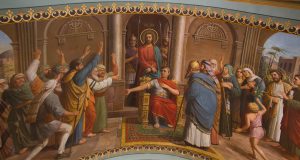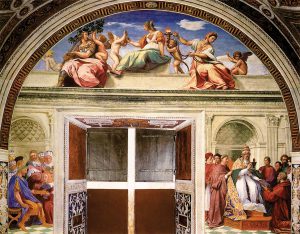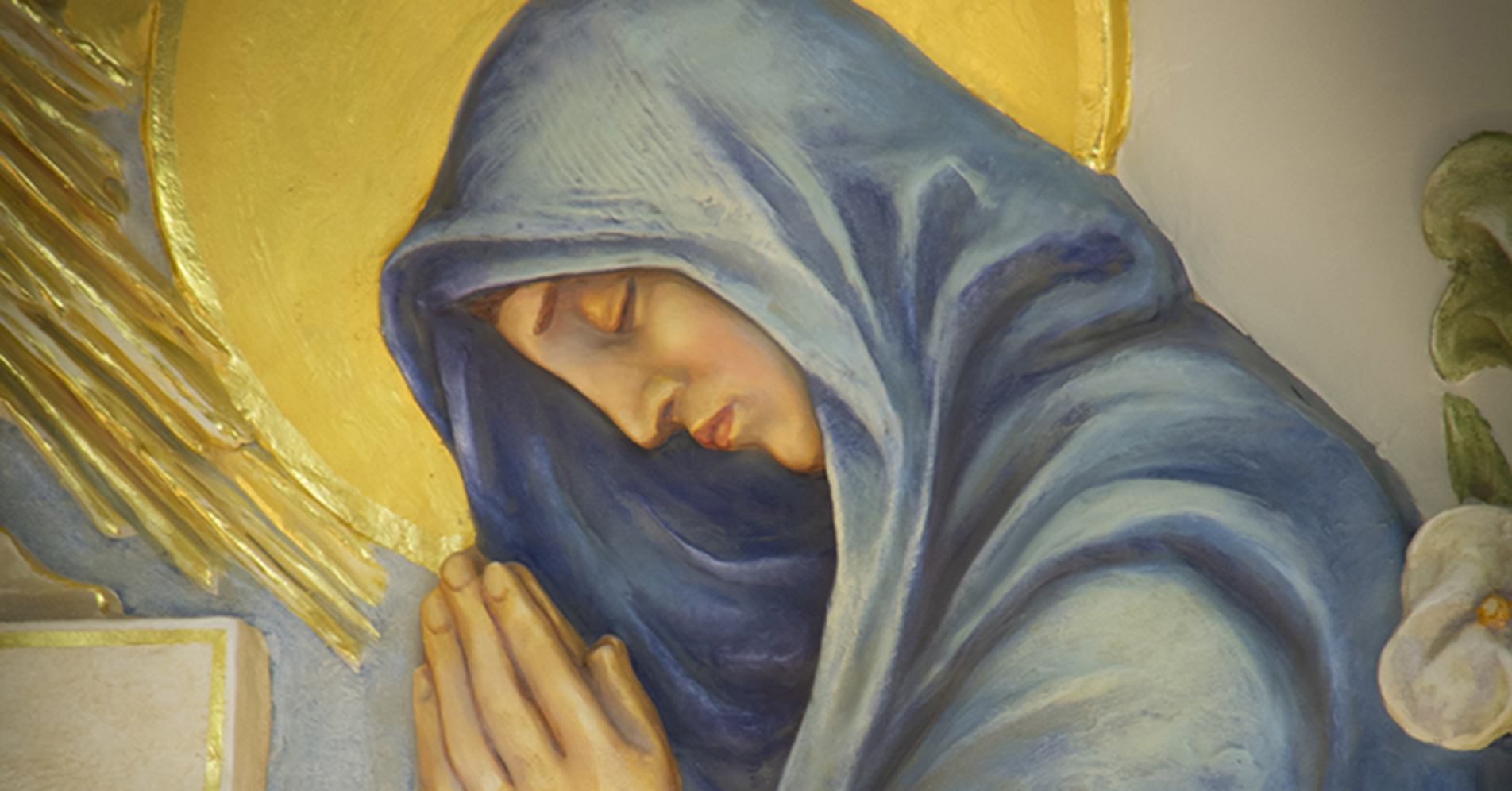
By Renae Kranz
Pride is a sneaky sin. It’s the sin of the Fall in the Garden of Eden. It creeps around seeking the ruin of souls.
It seems like pride would be easy to recognize since it’s considered by many to be the root of sin, but it’s surprisingly stealthy in its manifestations. One way we often see it is when we think to ourselves, “I can do this on my own.” Or it could be, “I don’t need God for this.” Or even, “Look at all the good I’ve done.”
It’s an easy trap to fall into—we want to be our own god. This was the sin of Adam and Eve, and it continues to be our biggest downfall.
God didn’t leave us without an antidote, however. There is one virtue that is a powerful weapon against the sin of pride: the virtue of humility.
Recognizing pride
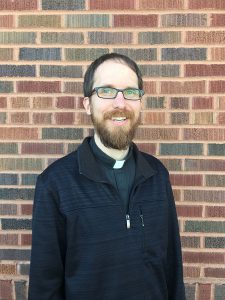
Father Jeff Norfolk, pastor at Risen Savior Parish in Brandon, has seen the devastation of prideful thinking firsthand during his time as a priest, as a chaplain in South Dakota prisons, and as a person who has lived in the culture for 40 years. He sees the problem starting from a young age when children are taught they have to make themselves successful, that it all depends on them. After five years of working on college campuses in his priesthood, he saw kids work really hard, but they couldn’t be what they wanted to be.
“That’s really devastating when you teach someone that and then it doesn’t come to fruition,” Father Norfolk says. “I think that’s really detrimental to how we live as human beings. And it’s so contrary to who God made us to be.”
Father Norfolk sees how pride can act as a root of each of the other seven deadly sins: greed, lust, envy, gluttony, wrath and sloth. When we try to make ourselves happy or successful without God, it’s easy to fall into gluttony or lust or greed because we begin to grasp after these things rather than reaching out for God. Or when an obstacle pops up in life and suffering follows it, we allow anger and rage to consume us because things didn’t turn out how we wanted.
Even sloth or laziness begins with pride. When we feel like we can do whatever we want with our time with no consequences, we might decide to be lazy. Because it’s our time, we will determine how to use it. God doesn’t come into play at all.
When you start to really consider all the ways pride rears its head, it can become overwhelming to try to overcome it. Lois Heron, parishioner at the Cathedral of Saint Joseph, has actively struggled with pride almost her whole life. She calls it her besetting sin, meaning something that troubles her persistently.
At one point in her life when she and her family were facing a deep struggle, she found herself turning inward to handle the problems on her own. She created thick and high boundaries around herself because of her pride, but she came to realize she needed to pray about it. That was the beginning of recognizing the pride she was holding onto.
“I was already acquainted with the saints and the Scriptures and praying with the Lord about it, but I didn’t have the tools to work through it,” Lois said. “This is where God’s grace came in through our journey.”

It was at this time that she and her husband were making their way into the Catholic Church from Protestantism. Hope came back slowly as she prayed, and she longed for the Eucharist and confession to help her through her trials. Once she was able to receive both of those sacraments, her struggle broke open and she began to gain traction in her fight against pride. She says she felt a bit like Jacob after wrestling with God in Genesis.
“Those were very difficult years, but I wouldn’t trade them for anything because what they’ve done for me, what they’ve done for my husband, what we’ve seen unfold in our family and the miraculous healing in the trauma that we were experiencing. I had to go through those. The Lord had to allow it,” Lois says. “That seemed to be a big catalyst for really helping me to gain traction in humbling myself.”
Father Norfolk suggests some very concrete ways to recognize pride in our own lives. The best way is to be attentive to our thoughts as we go through our day and notice any patterns of pride, self-reliance or a false self-security that develop. Ask yourself why you were anxious or angry in a specific situation. Those thoughts usually arise because we feel a loss of control and we don’t like that feeling.
He says we should also be attentive to our feelings and desires. If the things you desire don’t materialize the way you want, are you upset? Or can you accept your new situation?
Another way to spot pride is to pay special attention to your own self-talk. In recalling the parable of the Pharisee and the tax collector (Luke 18:9-14), the Pharisee’s pride had him extolling his own supposed virtues and comparing himself (a righteous man in his own eyes) to the tax collector who prayed nearby. The tax collector, who knew he was a sinner and needed God’s mercy, beat his breast and wouldn’t even look up to heaven as he prayed. This is a stark picture of the difference between pride and humility.
With this in mind, Father Norfolk says to be aware of times we might be affirming ourselves and ask this question, “Why am I not receiving that affirmation from God? Why does it have to come from myself?”
“This is part of the reason I think silence is so important is so I can receive the Father’s affirmation,” Father Norfolk says. “And I don’t get caught in myself trying to affirm and trying to make myself feel good about myself, because that’s self-focused, that’s self-centered.”
In Father Norfolk’s experience, we as Americans have an especially hard time with pride because of everything we have available to us. Since we can get pretty much anything we want, it’s hard to feel a need for God. But the need is real. He has a plan for us that is better than any of our own plans. It may not be a plan with a smooth path, but it will lead us to the joy of a deep relationship with our Creator.
“When it comes to a relationship with Jesus, it’s not about working harder, it’s about giving yourselves over more to him,” Father Norfolk says. “And so it’s this contrast of how we’ve been taught and formed for so long, and now Christ comes and says, ‘Actually, I don’t want you to do more. I want you to let ME do more.’”
It requires surrender.
Freedom through humility
In Matthew 18:3 Jesus says, “Truly I tell you, unless you change and become like children, you will never enter the kingdom of heaven.” That verse speaks to Father Norfolk of the need not to become little, but to accept that we ARE little. It’s an important distinction to accept that we don’t need to be made little. We’re already little. We need Jesus to help us accept our littleness.
“As human beings, we’re already weak and we’re finite and we have limitations, but we don’t accept that well,” Father Norfolk says. “So for me, part of the key of becoming childlike is just to accept that I’m limited and that I have weaknesses and instead of getting frustrated or angry, I just turn to Jesus and say, ‘Here I am again, acknowledging my littleness, accepting my littleness. Thank you for your grace. Thank you for your love. Please help me to become strong. Please help me to recognize how much I need you.’”
Both Father Norfolk and Lois often turn to prayers like the Litany of Humility and the Litany of Trust to help them pray through their struggles with pride and ask Jesus for help. They also both turn to our Blessed Mother Mary and her Magnificat as a beautiful example of humility. From the beginning of her Immaculate Conception, God gave Mary graces she could not accomplish on her own.
 Father Norfolk points out that Mary begins her Magnificat in the Gospel of Luke by rejoicing in God’s goodness to her. Then she makes a bold statement: “All generations will call me blessed.” Father Norfolk says that sounds very prideful, but that is not what Mary is expressing.
Father Norfolk points out that Mary begins her Magnificat in the Gospel of Luke by rejoicing in God’s goodness to her. Then she makes a bold statement: “All generations will call me blessed.” Father Norfolk says that sounds very prideful, but that is not what Mary is expressing.
“She understands what God has done in her life, and she’s claiming that,” Father Norfolk says. “Mary accepts who she is. In my littleness he’s reached out to me, he’s provided for me. And then this is who he’s made me to be. I think the Magnificat is a powerful place to look to.”
Lois also sees the value of Mary’s rejoicing and prays it every morning.
“Those first few words, ‘My soul magnifies the Lord and my spirit rejoices in God my savior.’ There’s the attitude I should have,” Lois says. “And then the next line is, ‘For he has regarded the lowest state of his handmaiden.’ And when I’m praying that, I think the lowest state, my pride. And he’s looked on that. But my job is to magnify the Lord and keep my eyes fixed on Him. And then that fiat comes little by little.”
Humility puts our focus back on God and helps us be honest with ourselves about who we really are: not our own god, but children of God the Most High. Eve couldn’t accept her identity and grasped for something that wasn’t hers. Mary accepts and humbly makes her fiat to God at the annunciation.
Father Norfolk works daily toward this acceptance and humility rather than grasping and falling back into pride. He says he has to be honest with himself about falling short on loving well, being patient or having it all together.
“So I have the willingness and the honesty to accept who I’m not. And yet also the truth, that by your grace and by your transforming power of being in relationship with you, I can become, in union with you, who you made me to be,” Father Norfolk says in his own fiat.
He says the greatest tool we have to grow in humility is gratitude. Being grateful every day turns our hearts back to God and holds our gaze on Him instead of ourselves.
The tools Lois turns to most in her struggle with pride are sacrifice, uniting her suffering and her joys with Christ, and living the sacramental life. The same tools can help shore up our own struggles. All throughout the fight against pride, God never leaves us alone.
Let loose the bonds
Lois has noticed during her long struggle with the sin of pride that just when she gets one facet of it taken care of, a new facet will pop up for attention. “We can’t handle Him cleaning out every closet all at once. And so in fits and starts in life, I’ve been humbled and I’ve submitted to the humbling,” she says.
As a visual person, Lois compares working through the many manifestations of pride to the raising of Lazarus by Jesus. When Lazarus stood in front of the crowd, he was bound with strips of burial cloth, and Jesus told them, “Unbind him, and let him go.” (John 11:44) Lois sees that as a picture of transformation.
“Sometimes when I’m going through a lesson on pride, it’s like I feel some of the bandages or the death chords being unwrapped by the Lord as I cooperate,” Lois says. “Slowly over time, it loosens, but He only leads us as much as we can be led at any given point.”
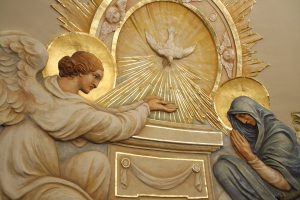 It’s taken many years to learn humility for Lois, and God has only given her what she was ready for at the time. She says it’s been like teaching a baby to walk as He holds her hand to help her learn.
It’s taken many years to learn humility for Lois, and God has only given her what she was ready for at the time. She says it’s been like teaching a baby to walk as He holds her hand to help her learn.
“He’s going to release his grip little by little to see if I’m learning that humility thing yet. And maybe, maybe not. Or then I fall,” Lois says. “And it seems like all of life’s been like that, but each time I’m learning to walk. So each time I’m learning humility.”
Thankfully Lois has seen that the Lord is patient, not only with her, but with all of us. Confession has been a key component in learning humility for her, along with the Eucharist and good spiritual direction.
“The Lord is faithful to bring just little moments, words from people I trust, sacred Scripture, a homily, just a moment in nature, and it’s like he’s giving me nuggets,” she says. “But I have to stay in tune and open. And there’s the rub, but that’s where confession helps, I think because the more you confess it, the more open you become.”
It all comes back to humility. Jacques Philippe captures it well in his book, “Interior Freedom.”
“Humility is truth. I am what I am in God’s eyes: a poor child who possesses absolutely nothing, who receives everything, infinitely loved and totally free. I have received everything in advance from the freely bestowed love of my Father, who said to me definitively: ‘All that is mine is yours.’”
Litany of Humility
 O Jesus! Meek and humble of heart,
O Jesus! Meek and humble of heart,
Hear me.
From the desire of being esteemed
Deliver me, Jesus.
From the desire of being loved
Deliver me Jesus.
From the desire of being extolled
Deliver me, Jesus.
From the desire of being honored
Deliver me, Jesus.
From the desire of being praised
Deliver me, Jesus.
From the desire of being preferred to others
Deliver me, Jesus.
From the desire of being consulted
Deliver me, Jesus.
From the desire of being approved
Deliver me, Jesus.
From the fear of being humiliated
Deliver me, Jesus.
From the fear of being despised
Deliver me, Jesus.
From the fear of suffering rebukes
Deliver me, Jesus.
From the fear of being calumniated
Deliver me, Jesus.
From the fear of being forgotten
Deliver me, Jesus.
From the fear of being ridiculed
Deliver me, Jesus.
From the fear of being wronged
Deliver me, Jesus.
From the fear of being suspected
Deliver me, Jesus.
That others may be loved more than I,
Jesus, grant me the grace to desire it.
That others may be esteemed more than I
Jesus, grant me the grace to desire it.
That, in the opinion of the world, others may increase and I may decrease,
Jesus, grant me the grace to desire it.
That others may be chosen and I set aside,
Jesus, grant me the grace to desire it.
That others may be praised and I unnoticed,
Jesus, grant me the grace to desire it.
That others may be preferred to me in everything,
Jesus, grant me the grace to desire it.
That others may become holier than I, provided that I may become as holy as I should,
Jesus, grant me the grace to desire it.
Amen

